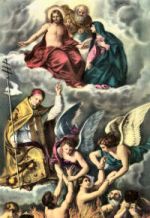Make your gift today!
Help keep Catholics around the world educated and informed.
Already donated? Log in to stop seeing these donation pop-ups.
Fathers of the Church
Letter XCV: to Pulcheria Augusta By the Hand of Theoctistus the magistrian
by Leo the Great in 451 | translated by Charles Lett Feltoe, M.A
Leo, the bishop to Pulcheria Augusta.
I. He informs the Empress that he has loyally recognized the Council ordered by her, and sent representatives with letters to it.
Your clemency's religious care which you unceasingly bestow on the catholic Faith, I recognize in everything, and give God thanks at seeing you take such interest in the universal Church, that I can confidently suggest what I think agreeable to justice and kindness, and so what thus far your pious zeal through the mercy of Christ has irreproachably accomplished, may the more speedily be brought to an issue which we shall be thankful for, O most noble Augusta. Your clemency's command, therefore, that a Synod should be held at Nicaea, and your gently expressed refusal of my request that it should be held in Italy, so that all the bishops in our parts might be summoned and assemble, if the state of affairs had permitted them, I have received in a spirit so far removed from scorn as to nominate two of my fellow-bishops and fellow-presbyters respectively to represent me, sending also to the venerable synod an appropriate missive from which the brotherhood therein assembled might learn the standard necessary to be maintained in their decision, lest any rashness should do detriment either to the rules of the Faith, or to the provisions of the canons, or to the remedies required by the spirit of loving kindness.
II. In the settlement of this matter that moderation must be observed which was entirely absent at Ephesus.
For, as I have very often stated in letters from the beginning of this matter, I have desired that such moderation should be observed in the midst of discordant views and carnal jealousies that, whilst nothing should be allowed to be wrested from or added to the purity of the Faith, yet the remedy of pardon should be granted to those who return to unity and peace. Because the works of the devil are then more effectually destroyed when men's hearts are recalled to the love of God and their neighbours. But how contrary to my warnings and entreaties were their actions then, it is a long story to explain, nor is the need to put down in the pages of a letter all that was allowed to be perpetrated in that meeting, not of judges but of robbers, at Ephesus; where the chief men of the synod spared neither those brethren who opposed them nor those who assented to them, seeing that for the breaking down of the catholic Faith and the strengthening of execrable heresy, they stripped some of their rightful rank and tainted others with complicity in guilt; and surely their cruelty was worse to those whom by persuasion they divorced from innocence, than to those whom by persecution they made blessed confessors.
III. Those who recant their error must be treated with forbearance.
And yet because such men have harmed themselves most by their wrong- doing, and because the greater the wounds, the more careful must be the application of the remedy, I have never in any letter maintained that pardon must be withheld even from them if they came to their right mind. And although we unchangeably abhor their heresy, which is the greatest enemy of Christian religion, yet the men themselves, if they without any doubt amend their ways and clear themselves by full assurances of repentance, we do not judge to be outcasts from the unspeakable mercy of God: but rather we lament with those that lament, "we weep with those that weep[7a]," and obey the requirements of justice in deposing without neglecting the remedies of loving-kindness: and this, as your piety knows, is not a mere word-promise, but is also borne out by our actions, inasmuch as nearly all who had been either misled or forced into assenting to the presiding bishops, by rescinding what they had decreed and by condemning what they had written, have obtained complete acquittal from guilt and the boon of Apostolic peace.
IV. Even the authors of the mischief may find room for forgiveness by repentance.
If, therefore, your clemency deigns to reflect upon my motives, it will be satisfied that I have acted throughout with the design of bringing about the abolition of the heresy without the loss of one soul; and that in the case of the authors of these cruel disturbances I have modified my practice somewhat in order that their slow minds might be aroused by some feelings of compunction to ask for lenient treatment. For although since their decision, which is no less blasphemous than unjust, they cannot be held in such honour by the catholic brotherhood as they once were, yet they still retain their sees and their rank as bishops, with the prospect either of receiving the peace of the whole Church, after true and necessary signs of repentance or, if (which God forbid) they persist in their heresy, of reaping the reward of their misbelief. Dated 20th of July, in the consulship of the illustrious Adelfius .
Taken from "The Early Church Fathers and Other Works" originally published by Wm. B. Eerdmans Pub. Co. in English in Edinburgh, Scotland, beginning in 1867. (LNPF II/XII, Schaff and Wace). The digital version is by The Electronic Bible Society, P.O. Box 701356, Dallas, TX 75370, 214-407-WORD.






